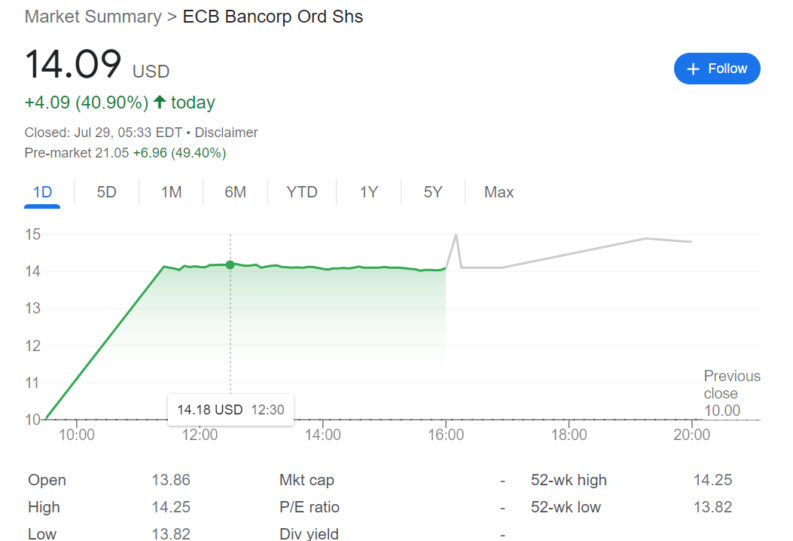Key points:
- ECB Bancorp stock has jumped after the IPO
- This is usually defined as a successful IPO
- But are we considering this the wrong way around?
ECB Bancorp (NASDAQ: ECBK) has jumped 50% premarket after its IPO or float yesterday. This shows just how difficult it can be to value a company for such an IPO or float. We can do all of the usual spreadsheet models and try out variations but no one ever really knows the right price until the pedal hits the metal and the market can start buying – or not as sometimes obviously happens.
ECBK is the result of the demutualisation of Everett Co-operative Bank and the introduction to the market would be described by most as a success. The offering was at $10, initial trading raised that to $14 or so and it's been over $20 premarket this morning. That is what is usually described as a success for an IPO, that there's such a substantial pop. That's probably not the right way to look at it though.
We can also observe that the pop is fading as the morning goes on. Even as this piece is being written the premarket rise is back down to 34%.

Also Read: Best Financial Stocks To Buy Right Now
One thing ECBK can help us walk through is exactly what does define a success in an IPO? We all know what the usual definition is – the ECB Bancorp stock should rise after it has been placed upon the stock market. That's the success, the pop. But if we think about this more clearly we can say that this is a failure.
Think on it a little more. The previous stockholders in ECB Bancorp were selling their stock. OK, it was a mutual but still the revenue from the stock sales is going somewhere (into capital for the bank). OK, so when someone sells something they want to get the best price they can for what they're selling. So, a company doing an IPO would prefer that it got a nice high price for its new stock offered to the market. One signal of getting a nice high price is that it subsequently falls.
No, really, success in an IPO for the issuer should be defined by the stock price falling after the IPO. They sold at $10 (imagine) it's now worth $6, they just made $4, right? But that's not the way around that we do evaluate IPOs which is one of those odd things.
We count success as being something that produces an IPO pop – as here with ECBK. Sure, us investors out here – those who bought in of course – have made money but that's not quite the right way, philosophically, to treat the issue. Or at least possibly it isn't. The people selling the stock have made less money than they possibly could have done. How is that not a failure for them? And if they'd made more and investors had then lost, how is that not a win for those selling stockholders?
The whole way we evaluate, in common language, the success or not of an IPO like ECB Bancorp is more than a little head over heels that is.
